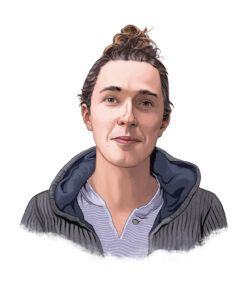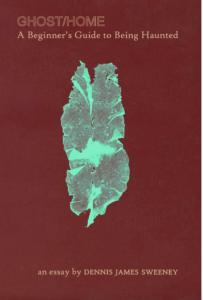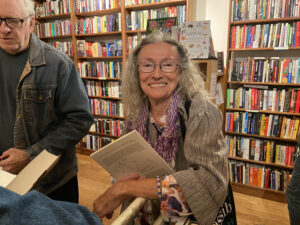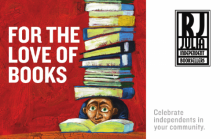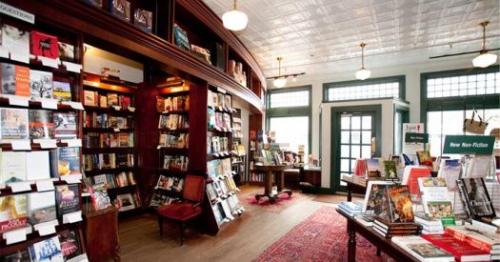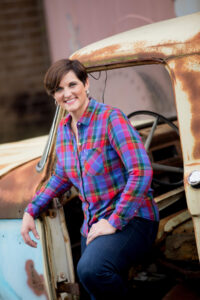Publishing Talks Interviews Thad McIlroy-Future of Publishing
November 24, 2025 by David
Filed under PublishingTalks, Technology, The Future
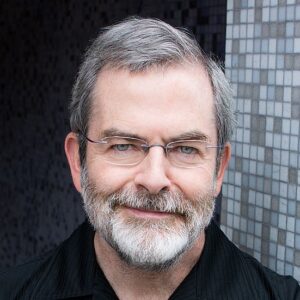 Publishing Talks started as a series of conversations with book industry professionals and others involved in media and technology, mostly talking about the future of publishing, books, and culture. It was great fun talking with people in the book industry about the evolution of publishing in the context of technology, culture, and economics.
Publishing Talks started as a series of conversations with book industry professionals and others involved in media and technology, mostly talking about the future of publishing, books, and culture. It was great fun talking with people in the book industry about the evolution of publishing in the context of technology, culture, and economics.
In the past few years, I’ve talked with a variety of editors, publishers and others who have been innovators and leaders in independent publishing and bookselling in the past and into the present.
These conversations have been inspirational to me. I have had the pleasure of speaking with visionaries and entrepreneurs, editors, publishers and others who have influenced and changed contemporary literature and culture. I’ve also had the opportunity to speak with a number of friends and colleagues in the book business.
I really enjoy the opportunities to find out about the boundless creativity that motivates so many of us in the book business, and I also really enjoy talking to others in the business, who like me, have tried to make sense of it all in some way or another. That’s one of the reasons I have frequently sought out other publishing consultants, gurus, and observers over the years, to talk about various topics in publishing. Sometimes it is about the history of books, but more often during the past almost twenty years of this series, conversations have centered on change and the future of publishing.
And that brings me to Thad McIlroy, a publishing consultant and author whose aptly named website is The Future of Publishing. As you can imagine, Thad and I had a great time together, and I hope you will enjoy hearing what he has to say, especially about emerging technology. Thad is a really smart guy who understands publishing from multiple perspectives.
AI discussions cannot be avoided at this point. My current thinking is that the version of AI we have now (LLMs) is not going to be the AI technology that will eventually take over our world. In the meantime, human creativity is still valued and it would surprise no one if there is a massive backlash against this technology before too long, especially as it is applied to the creative arts. Would love to hear what listeners think, so feel free to comment.
Here’s what Thad sent me as a working bio: “Writing and publishing are in my blood—my father was an author and broadcaster, and Kenneth Grahame (The Wind in the Willows) was my third cousin. I began as a bookseller in Toronto, then founded Virgo Press (1977) and co-founded book distributor Beatty & Church (1979). In 1985, I created what I believe was the first trade book using desktop publishing technology.
Now based in San Francisco, I’m an electronic publishing consultant, and author. I co-founded Publishing Technology Partners and serve as contributing editor at Publishers Weekly, focusing on AI and innovation. My latest book is  (2024, re 2025). I’ve authored dozens of books and articles exploring publishing technology, metadata, and industry transformation.”
(2024, re 2025). I’ve authored dozens of books and articles exploring publishing technology, metadata, and industry transformation.”
Thad’s current interests are focused on AI. Here is a recent post of his on Onix 3 (if you’re not in the book business, this piece may be a bit in the weeds for you, but if you are in the business and care about data, search and findability, this matters – alot.)
Podcast: Play in new window | Download
Publishing Talks Interviews Derek Newton/Verify My Writing
October 24, 2025 by David
Filed under PublishingTalks, Technology, The Future
 Publishing Talks started as a series of conversations I had with book industry professionals and others involved in media and technology, talking about the future of publishing, books, and culture. It was great fun discussing the evolution of publishing in the context of technology, culture, and economics.
Publishing Talks started as a series of conversations I had with book industry professionals and others involved in media and technology, talking about the future of publishing, books, and culture. It was great fun discussing the evolution of publishing in the context of technology, culture, and economics.
More recently, I’ve also had conversations with a variety of editors, publishers and others who have been innovators and leaders in independent publishing and bookselling in the past and into the present.
These conversations have been inspirational to me. I have had the pleasure of speaking with visionaries and entrepreneurs, editors, publishers, and others who have influenced and changed contemporary literature and culture. I’ve also had the opportunity to speak with a number of friends and colleagues in the book business about their work.
I really enjoy these opportunities to learn about the boundless creativity that motivates so many in the book business. I was approached recently by a PR firm who wanted me to talk to edtech writer Derek Newton about a new project he has undertaken. While my first reaction was to ignore what seemed to be yet another “pitch,” when I read further about the project, my interest was piqued and I decided I should talk to Derek to find out more about his ideas.
Derek Newton has written extensively about education and technology, including contributions to the Atlantic, Washington Post, USA Today, Money Magazine and many others. He’s also a contributing writer at Forbes and founder of the new and very interesting project that we talked about in this episode, Verify My Writing.
Verify My Writing allows writers to get a verified certification that their work is real, authentic, and human. In short, this enables them to certify that their work was not created by AI. The certification can help with submissions and pitches. Verify My Writing also certifies books and articles that have already been published with a “Human-Written” hallmark. And as Derek and I discussed, there other applications for this sort of certification as well. While writers certainly have self-interest in proving to magazines and publishers that their work is original, it seems to me that publishers will also want to verify for themselves when they receive submissions that the work they are reading is wholly or at least substantially original.
Book publishers and magazines with limited editorial resources are now dealing with a tsunami of submissions, with no practical way to determine the originality of the work they are considering for publication.
Given how good some AI-assisted writing can be, and how often AI is inaccurate (or completely wrong), there’s no question that all of us as readers will also appreciate knowing whether what we are reading online is human or machine written. This sort of validation may become a requirement in the not too distant future.
I found this conversation to be stimulating and thought provoking. Derek’s Verify My Writing seems interesting, and compelling in that it comes from a writer whose work experience inspired it. I hope you find this conversation as stimulating as I did.
Here’s the Verify My Writing website.
If you want to learn more, contact Derek directly: DNewton@VerifyMyWriting.com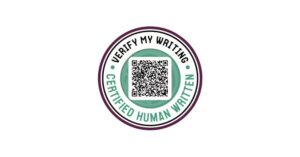
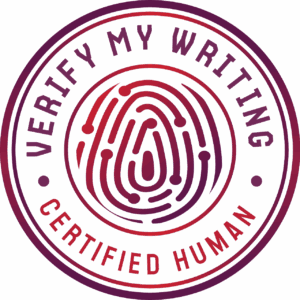
Podcast: Play in new window | Download
Tamara Dean: Shelter and Storm: At Home in the Driftless
September 9, 2025 by David
Filed under Non-Fiction, WritersCast
 Shelter and Storm: At Home in the Driftless – Tamara Dean – University of Minnesota Press – 9781517918569 – Paperback – 224 pages – April 22, 2025 – $19.95 -ebook editions available at lower prices
Shelter and Storm: At Home in the Driftless – Tamara Dean – University of Minnesota Press – 9781517918569 – Paperback – 224 pages – April 22, 2025 – $19.95 -ebook editions available at lower prices
Books like Shelter and Storm are all too often errantly categorized as “regional,” both by publishers and reviewers alike. That’s a problem, as if you think of this book as being “only” about the Driftless region, or Wisconsin, or even the Midwest as its “region,” too many readers might not be interested enough to read this book. It’s an irony for anyone writing from or about a specific place – it may be that through a deep understanding of a unique place that one can address and communicate the most universal issues of human life and the natural world.
Tamara Dean is a truly gifted writer, and I suspect that she can write well about almost anything. But this book is personal, and it gives her storytelling abilities the opportunity to shine. There are twelve “stories” in this book, really linked chapters that document on multiple levels, the time she spent during a “return to the land” experience not that many years ago in the truly unusual region called The Driftless because the glaciers that extended across this continent managed to miss this part of what is now mostly Wisconsin (and a bit in Iowa). It’s not flat there, but rather consists of steep hills and deep valleys, highly forested with a number of spring-fed streams.
While the stories are about Dean’s life there, she uses her own experiences to illuminate a variety of issues that matter to almost all of us, from climate change as it affects peoples lived lives (especially in farm communities), how people create community and mutuality, survive natural and household disasters, and citizen science (with a special interest in blue-glow fireflies). Dean’s personal experiences are transformative for her, and through her essays, for us as well
Tamara Dean’s Shelter and Storm is reminiscent of the best writing about nature and rural living, including works by Aldo Leopold, Edward Abbey, Wendell Berry and Gary Paul Nabhan. Tamara Dean’s writing will engage those many of us who care deeply about climate change and sustainability, and her stories will make you feel that it is possible and necessary to spend more time not only being in the natural world, but reflecting on what it means now for us in our alienated, disconnected, thoroughly modern world, and how we might forge a way of being that allows us to live better lives and preserve some level of nature still.
I do want to say that this book is one of the best of the many I have read this year. And I truly enjoyed having the opportunity to speak with Tamara about the book and her experiences in the Driftless, a place I now very much want to visit to experience for myself.
Tamara Dean’s essays and stories have been published in magazines including The American Scholar, The Georgia Review, the Guardian, One Story, Orion, and The Progressive. She is also the author of The Human-Powered Home: Choosing Muscles over Motors. She teaches writing independently in various locales.
“It may sound familiar, but Shelter and Storm is an engaging read largely because Dean is a very good writer.”—Big River Magazine
“Tamara Dean’s luminous essay collection paints a thoughtful portrait of the Driftless region of Wisconsin and the struggles it faces due to climate change.”—Shelf Awareness
“The essays collected in Shelter and Storm, grounded in Dean’s experience tending to and rewilding neglected farmland in the Driftless region, are a product of Dean’s lively, curious, meticulous mind, exploring topics as varied as the impacts of climate change, the challenges of sustainable living, brickmaking, prairie tending, and the history of abortion […] At their essence, these essays are informed by awe. They are about what happens when we make space in our lives for deep attention and wonder.”—Craft Magazine
Author website here.
Buy the book at Bookshop.org
Podcast: Play in new window | Download
Publishing Talks Interview with Lauren Woods of LitBox
August 20, 2025 by David
Filed under PublishingTalks, Technology
 Publishing Talks started as a series of conversations with book industry professionals and others involved in media and technology, mostly talking about the future of publishing, books, and culture. It was great fun talking with people in the book industry about the evolution of publishing in the context of technology, culture, and economics. In the past few years, I’ve talked with a variety of editors, publishers and others who have been innovators and leaders in independent publishing and bookselling in the past and into the present. These conversations have been inspirational to me. I have had the pleasure of speaking with visionaries and entrepreneurs, editors, publishers and others who have influenced and changed contemporary literature and culture. I’ve also had the opportunity to speak with a number of friends and colleagues in the book business.
Publishing Talks started as a series of conversations with book industry professionals and others involved in media and technology, mostly talking about the future of publishing, books, and culture. It was great fun talking with people in the book industry about the evolution of publishing in the context of technology, culture, and economics. In the past few years, I’ve talked with a variety of editors, publishers and others who have been innovators and leaders in independent publishing and bookselling in the past and into the present. These conversations have been inspirational to me. I have had the pleasure of speaking with visionaries and entrepreneurs, editors, publishers and others who have influenced and changed contemporary literature and culture. I’ve also had the opportunity to speak with a number of friends and colleagues in the book business.
I really enjoy the opportunities to find out about the boundless creativity that motivates so many of us in the book business. When I read about Lauren Wood and her cool new project, Litbox, a book vending machine in Washington, DC, I had to reach out to her to find out more about it. Lauren’s goal was to create an innovative way to promote local readership with local authors, something that writers always feel strongly about. Even the best independent bookstores do not focus as much attention on local authors as most of us wish they would. “I want to give writers and people in this town something to feel excited about,” she says. “I wanted to bring a little bit of optimism into an otherwise bleak moment….Great literature is really about empathy and kind of deeply getting outside of your own framework and inhabiting another person’s consciousness.”
LitBox launched in May, 2025. Lauren made it work with a Kickstarter campaign that raised seed capital of $5000.
Almost everyone in the book business recognizes how challenging it is to connect books with readers in our media’s overwhelmingly saturated information deluge. Any project that can connect writers and books to readers in a personalized, area-specific way is worthy of our support. I am hopeful that Litbox will not be a one-off, and could inspire others to try out the idea. It seems to have worked successfully in England, where there are book vending machines in subway stations and many other locales.
If you’re in the DC area, look for a Litbox and try it out. It’s in the Western Market.
And here’s a good local story about the Litbox launch on the “Inchy’s Bookworm Vending Machine” website. It looks like they are encouraging others to use their machine wherever books could be sold by machine. I hope this idea catches on!
Reggie Van Lee buying the first book from LitBox.


Podcast: Play in new window | Download
Dennis James Sweeney: How to Submit: Getting Your Writing Published with Literary Magazines and Small Presses
March 20, 2025 by David
Filed under Non-Fiction, WritersCast
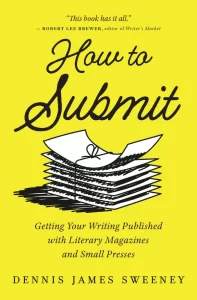 How to Submit: Getting Your Writing Published with Literary Magazines and Small Presses – Dennis James Sweeney – New World Library – Paperback – 9781608689361 – 216 pages – $18.95 – February 25, 2025 – ebook versions available at lower prices
How to Submit: Getting Your Writing Published with Literary Magazines and Small Presses – Dennis James Sweeney – New World Library – Paperback – 9781608689361 – 216 pages – $18.95 – February 25, 2025 – ebook versions available at lower prices
This book is described by its publisher as “A comprehensive guide to getting published and building a literary reputation through small presses and magazines — and taking ownership of your own publishing life.” While I am very familiar with publishing marketing lingo, I think this description, while literally accurate, actually undervalues Sweeney’s book. He does offer us much more than just a “guide to getting published.” By talking to writers as a colleague and exploring his own journey as a writer, he turns what could have been a mechanical self help guide into something much more interesting and engaging.
I’ve been on both sides of the process this book is about – as a writer submitting work for publication and more often as a publisher and editor, combing through submissions of all kinds and qualities. This book provides much more than simply guidance, tools and support for writers. In it, Sweeney personalizes what is so often a depersonalized process, and helps writers see themselves as active agents in a complex ecosystem with many levels and activities. And in many ways, he reveals the process of “submitting” one’s work as an almost spiritual practice, not just a means to an end.
All of the podcast interviews I do are unstructured and informal – I like to start without notes or an agenda and see where the conversation goes. Talking to Dennis was truly a pleasure, and I think we ended up having a wonderfully organic and interesting conversation about the independent literary world, contemporary writing, and the role of the writer in that community. Whether you are already a published author, or a publisher or magazine that works with author submissions, this book has a great deal to offer you.
Dennis James Sweeney is a writer and teacher. His books have been published by small independent presses, including Autumn House Press, Essay Press, Ricochet Editions, and Stillhouse Press, and his writing has appeared in Ecotone, The Southern Review, Witness, and The New York Times. Sweeney lives, writes, and teaches in Amherst, Massachusetts. Author website here.
But the book here.
Podcast: Play in new window | Download
Maureen Owen and Barbara Henning: Poets on the Road
June 21, 2023 by David
Filed under Poetry, WritersCast
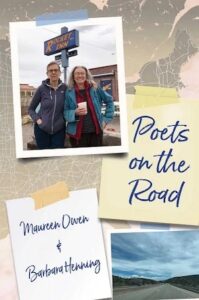 Poets on the Road – Maureen Owen and Barbara Henning – City Point Press – 9781947951709 – Paperback – 176 pages – $18 – June 6, 2023 – ebook editions available at lower prices
Poets on the Road – Maureen Owen and Barbara Henning – City Point Press – 9781947951709 – Paperback – 176 pages – $18 – June 6, 2023 – ebook editions available at lower prices
This is a special book by two very special poets. I know I am biased. They are both friends of mine, and Maureen I have known for almost fifty years. This terrific travelog documents an amazing poetic journey they took in 2019, crossing the country in a small car, with stops for poetry readings, visits with other poets, cheap motels and funky meals from Brooklyn (where Barbara lives), first south, then west all the way to California and back to Denver (where Maureen lives).
It was truly an incredible trip, originally documented in a blog they wrote while traveling. This book collects those stories and features photos of the poets and the people and places they visited along the way.
I loved this story so much, I decided to publish it, and consequently this book is a collaboration of the two poets plus the exceptional book designer, HR Hegnauer and publisher City Point Press.
Here’s an excerpt from Pat Nolan’s wonderful introduction:
Although a road trip across North American calls to mind Jack Kerouac’s youthful meanderings of self-discovery, this reading tour was more in the manner of Bashō’s late life journeys through the backcountry of Japan. . . . The road trip was in a sense a pilgrimage of reengagement with their calling as poets, and a chance to reacquaint with like-minded friends, old and new, in a far-flung landscape of American poetry.
Venues would include upscale bookstores, coffee houses, museums, legendary used bookstores, botanical gardens, university classrooms, art centers, and artist coops—in short, a unique sampling of poetry environments tracing an arc across the Southern States, the Southwest, and up the West Coast before hooking back to the Rockies.
Framed as a personal challenge, the poets hit the road much in the manner of itinerant preachers and musicians, lodging at discount motels, funky hostels, Airbnbs, and with friends along the way. Adding a social media touch, Maureen and Barbara created a blog of their tour so that friends, family, hosts, and fellow poets might also share in their adventure.
It’s always a pleasure to spend any amount of time with Maureen and Barbara, so this conversation was truly special for me, and I hope for all of you as well who will be listening in.
As further full disclosure, let me add that we were also in Tucson when she and Barb came to visit, so I am a participant and contributor to the blog and to the book as well, making it even more fun for me to talk to both Maureen and Barb about it here.
Maureen’s most recent book is let the heart hold down the breakage Or the caretaker’s log (Hanging Loose Press)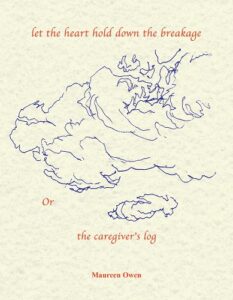
Barbara’s most recent book is Ferne, A Detroit Story (Spuyten Duyvil)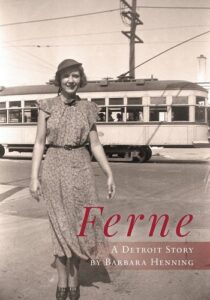
Buy Poets on the Road here. (this link is to Bookshop.org, sales will support indie bookstores)
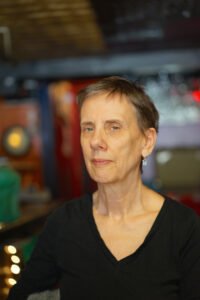 Barbara Henning (photo by Miranda Maher)
Barbara Henning (photo by Miranda Maher)
Podcast: Play in new window | Download
Publishing Talks: Interview with Jane Friedman
May 10, 2022 by David
Filed under Ebooks and Digital Publishing, Publishing History, PublishingTalks, The Future
 Publishing Talks started as a series of conversations with book industry professionals and others involved in media and technology, mostly talking about the future of publishing, books, and culture. It was great fun talking with people in the book industry about the evolution of publishing in the context of technology, culture, and economics.
Publishing Talks started as a series of conversations with book industry professionals and others involved in media and technology, mostly talking about the future of publishing, books, and culture. It was great fun talking with people in the book industry about the evolution of publishing in the context of technology, culture, and economics.
Later this series broadened considerably. In the past few years, I’ve talked with a variety of editors, publishers and others who have been innovators and leaders in independent publishing and bookselling in the past and into the present.
These conversations have been inspirational to me. I have had the pleasure of speaking with visionaries and entrepreneurs, editors, publishers and others who have influenced and changed contemporary literature and culture. I’ve also had the opportunity to speak with a number of friends and colleagues in the book business.
I’ve not had occasion to speak with the same person twice during all the years this series has gone on. But I really wanted to speak again with Jane Friedman, whose insights and knowledge I thoroughly respect, and get her sense of the current state of publishing and bookselling, especially as it affects writers and independent publishers. Our last Publishing Talks conversation was in 2015! Much has changed since then, and there was much for us to talk about.
Jane publishes a terrific newsletter I read religiously called The Hot Sheet. Her most recent book is The Business of Being a Writer (University of Chicago Press). Collaborating with The Authors Guild, she wrote The Authors Guild Guide to Self-Publishing. Her website offers a wide range of services and information for writers: “I report on the book publishing industry and help authors understand the business. I’ve been working in book publishing since the 1990s, but my views are not from the 1990s. Amidst rapid change in the industry, writers need honest and unbiased guidance to make the best decisions for their careers. I hope to offer you a signal amidst the noise.”
And I hope this conversation does the same.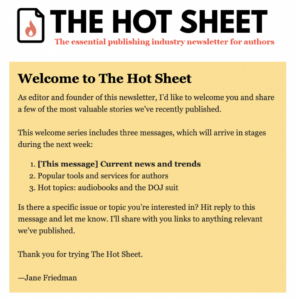
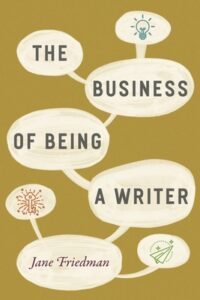
Podcast: Play in new window | Download
Publishing Talks: Interview with Roxanne Coady of R.J. Julia Booksellers
June 17, 2021 by David
Filed under PublishingTalks, The Future
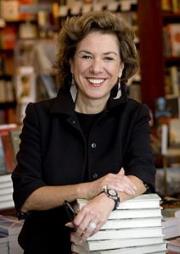 Publishing Talks began as a series of conversations with book industry professionals and others involved in media and technology, mostly talking about the future of publishing, books, and culture. I’ve spent time talking with people in the book industry about how publishing is evolving in the context of technology, culture, and economics.
Publishing Talks began as a series of conversations with book industry professionals and others involved in media and technology, mostly talking about the future of publishing, books, and culture. I’ve spent time talking with people in the book industry about how publishing is evolving in the context of technology, culture, and economics.
Some time ago, this series broadened to include conversations that go beyond the future of publishing. In an effort to document the literary world, I’ve talked with a variety of editors, publishers, booksellers, and others who have been innovators and leaders in independent publishing in the past and in the present.
These conversations have been inspirational to me on many levels. I have gotten to speak with visionaries and entrepreneurs, as well as editors and publishers who have influenced and changed contemporary literature and culture. I’ve also had the opportunity to speak with a number of friends and colleagues I have known over the many years I have been in the book business.
Bookstores have been an essential part of my entire life, even from early childhood, one benefit of growing up with a writer as father. Independent bookselling thrived from the late seventies into the late 1990’s, no doubt reflecting the Baby Boomer generation’s enthusiasm for books and ideas. The last twenty or more years have been very different, and now there are far fewer communities that support bookstores than at anytime in the past fifty years. Bookstores (along with public libraries) are a crucial element of a healthy culture, far more valuable than their size and scope would suggest. Local communities benefit from the presence of bookstores in many ways, and literary culture needs them too, as visible representations of a reading culture. Ideas grow and spread from books, but culture is also built around physically being present with one another.
So it is important for us to find ways as readers and literary citizens, to support bookstores, and it is equally important for booksellers to locate themselves, create and support communities around their stores, to support their workers and to make themselves meaningful enough to be thrive, despite the challenges of being small businesses in a mass-oriented consumer culture.
There are quite a few examples of booksellers who have made just such an impact, and their experiences and ideas are important for all of us to share and understand. It has been a particular pleasure for me to have known and worked with Roxanne Coady, the founder and owner of the exceptional R.J. Julia Booksellers, in Madison, Connecticut. We first met when Roxanne came to Connecticut to establish her new business after pursuing a successful career as a CPA in New York City. Over the years, I have spent many hours browsing their shelves, attending author events, and enjoying the cafe.
R.J. Julia has thrived during the period when local bookselling has faced an array of challenges, first from chain bookstores, then from Amazon and the rise of online retailing, and of course most recently, the pandemic. Throughout this time, Roxanne and her staff have innovated on many levels, including creating a drive-by pickup window for busy parents, putting on over 300 events a year (some of which are with celebrity authors), establishing an active email newsletter, providing online sales with speedy service, podcasting, and building an active book club. Throughout, the emphasis on community, care for staff as individuals, and listening to customers have been paramount characteristics of the enterprise. There is a bit of practical magic at work there, I think.
After more than 30 years of hard work and success, it’s obvious that Roxanne has quite a bit to say about what it takes to be a successful bookseller, to be a locally based business, and to be a crucial part of literary culture. I believe that our conversation should be meaningful for anyone interested in the future success of bookstores and the importance of building a real literary culture within a society that does not put enough value on books, authors, writing.
We need more bookstores! Visit the R.J. Julia Bookseller website and sign up for their newsletter.
Podcast: Play in new window | Download
The Brothers Mankiewicz: Hope, Heartbreak, and Hollywood Classics by Sydney Ladensohn Stern
February 27, 2021 by David
Filed under Non-Fiction, WritersCast
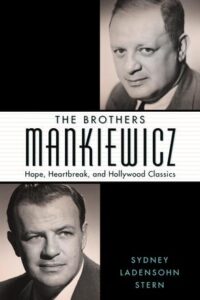 The Brothers Mankiewicz: Hope, Heartbreak, and Hollywood Classics – Sydney Ladensohn Stern- 9781617032677 – University Press of Mississippi – 480 pages – 88 b&w illustrations – October 2019 – Hardcover – $35 – ebook version available at lower prices
The Brothers Mankiewicz: Hope, Heartbreak, and Hollywood Classics – Sydney Ladensohn Stern- 9781617032677 – University Press of Mississippi – 480 pages – 88 b&w illustrations – October 2019 – Hardcover – $35 – ebook version available at lower prices
There are any number of characters and influencers in the history of modern American film-making, but among the many greats who contributed to its evolution into the dominant form of our popular culture, the Mankiewicz brothers stand out. Between them, they played critical roles in an incredible array of films that comprise our film canon today. Herman (1897–1953) and Joe (1909–1993) either wrote, produced, or directed (sometimes both or all) more than 150 films, from late era silents to almost modern era big budget productions.
Herman is credited with writing the screenplay for Citizen Kane with Orson Welles (though the amount of work done by each of them has long been disputed) and shared the picture’s only Academy Award. Joe won four Oscars altogether, including two for writing and directing All About Eve, which also was awarded Best Picture in 1950.
Both the older Herman and the much younger Joe started as writers and then became successful as producers and in Joe’s case as a director as well. They came to Hollywood as upwardly mobile children of immigrants, brilliant intellectually and wildly witty, and feeling extremely ambiguous throughout their careers about the value and importance of their work in film – concerned it seems, to not be recognized as serious artists, as their novelist and playwright friends had been. The conflict between art and popular culture defined their lives and caused them each great suffering.
Herman was an early member of the renowned Algonquin Round Table group of wits, and in his unhappiness and self destructiveness, frequently lost all his money gambling. He alienated all the major film studios, and was dead by the age of 55. At the same time that Herman was ruining his career, Joe found significant success as writer, producer, and director, although he was almost addicted to deeply felt romances with the stars he worked with, including Judy Garland, and Joan Crawford, causing terrible suffering to his wife and family.
Biographer Sydney Ladensohn Stern spent ten years in researching and writing this comprehensive portrait of twentieth century American film through the lens of two of its most important and compelling figures. She’s written a thorough and highly readable narrative that gives us a chance to understand the complexities of her characters, and for anyone with an interest in modern film history, this book will be irresistible. The Mankiewicz brothers are among the titans upon which the movie business was built – their writing helped to define the language we see now as emblematic of an entire era in American history. This was a very fun book for me to read and I very much enjoyed talking to Sydney about her book. I think you will enjoy hearing our conversation and you should read this book (now available as an audiobook too).
“one of the best of the recent biographies of screenwriters … One thing I love about her book are the footnotes that trace the lineage of some of the great Mank stories (“The white wine came up with the fish” and “Imagine that, the whole world wired to Harry Cohn’s ass”…) ” –Tom Stempel
Sydney Ladensohn Stern worked as a reporter for Fortune and Money magazines and as an editor and award-winning columnist for the Scarsdale Inquirer before she started freelance writing. Her column, “Suburban Exposure,” covered politics and contemporary culture as well as her family and community, but she discontinued it after her sons left home and stopped providing her with material. She has freelanced for numerous publications including the New York Times. Her first biography is Gloria Steinem: Her Passions, Politics, and Mystique.
Author website here.
Buy the book here.
Podcast: Play in new window | Download
Even as We Breathe, A Novel: Annette Saunooke Clapsaddle
December 1, 2020 by David
Filed under Fiction, WritersCast
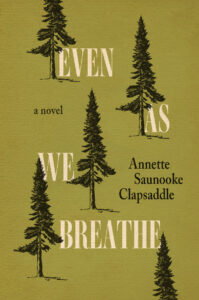 Even as We Breathe, A Novel – Annette Saunooke Clapsaddle – 9781950564064 – University Press of Kentucky – Hardcover – 240 pages – September 2020 – $24.95 – ebook versions available for sale at lower prices
Even as We Breathe, A Novel – Annette Saunooke Clapsaddle – 9781950564064 – University Press of Kentucky – Hardcover – 240 pages – September 2020 – $24.95 – ebook versions available for sale at lower prices
This has been a good year to read fiction, and I am really pleased to have discovered this author. She is a fine writer whose storytelling is powerful, yet restrained.
While this novel has some elements of a mystery, it is really a very personal story about family, love and growing up into the world of western North Carolina during World War II. The book’s main character is nineteen-year-old Cowney Sequoyah, who has grown up in the woods of Cherokee land, raised mostly by his grandmother. The novel is set between the upscale Grove Park Inn, an Asheville resort serving as an internment camp for diplomat prisoners of war and their families.
The Inn provides Cherokee men and women with employment off their reservation, and this is Cowney’s first real time away from home. At the core of the story, Cowley is accused of being involved in the disappearance of a diplomat’s daughter and must move back and forth to home as he attempts to understand the basis of the the unfair accusations, and prove his innocence while at the same time wrestling with his newfound love for another young Cherokee, Essie Stamper, and figuring out his complex family history.
There is alot going on in this subtle and quietly told novel! And a number of surprises are in store for the reader that bring the story to a remarkable and rewarding close.
Even As We Breathe is filled with details and moments that identify the Cherokee tribe and its homeland. The story gives Annette the opportunity to express the meanings of the Cherokee culture as it has survived into the modern world, sometimes still with the values of its people in conflict with the world of white people.
A secret room in the Grove Park Inn becomes a place where Cowney and Essie can escape the white world and try to imagine their futures independent of outsider influences. For awhile, it can feel to them that they have a place of their own. But racism and prejudice are constantly present, and both Cowney and Essie must face disappointment, and struggle to define their identities as Cherokees within a complicated environment that does not give them the space they truly need to be themselves.
Annette Saunooke Clapsaddle, an enrolled member of the Eastern Band of Cherokee Indians (EBCI), graduated from Yale University and has a masters from the College of William and Mary. Her unpublished novel, Going to Water won the Morning Star Award for Creative Writing from the Native American Literature Symposium and was a finalist for the PEN/Bellwether Prize for Socially Engaged Fiction. After serving as Executive Director of the Cherokee Preservation Foundation, Annette (National Board Certified since 2012) returned to teaching English and Cherokee Studies at Swain County High School. She is the former co-editor of the Journal of Cherokee Studies and serves on the Board of Trustees for the North Carolina Writers Network.
“Debut writer Annette Saunooke Clapsaddle lifts the curtain to show us a South we don’t know, revealed through the struggles of Cowney Sequoyah, a young man growing up within the Cherokee Nation of far Western North Carolina, and yet another surprise setting when he takes a job at Asheville’s fabled Grove Park Inn while it is being used by the US military as a place of internment for Axis prisoners of war during World War II. Even As We Breathe is a wonderful novel, complicated as life itself — thrilling, mysterious, and finally, a revelation!” — Lee Smith, New York Times bestselling author of Blue Marlin
This novel was impossible for me to put down and is one of my favorite books I have read this year. It was a deep pleasure for me to speak with Annette about this book and her writing.
I believe you will enjoy this conversation as much as I did.
Purchase Even as We Breathe from Bookshop.org to support independent bookselling.
Author’s website here.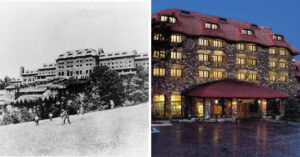
Podcast: Play in new window | Download




